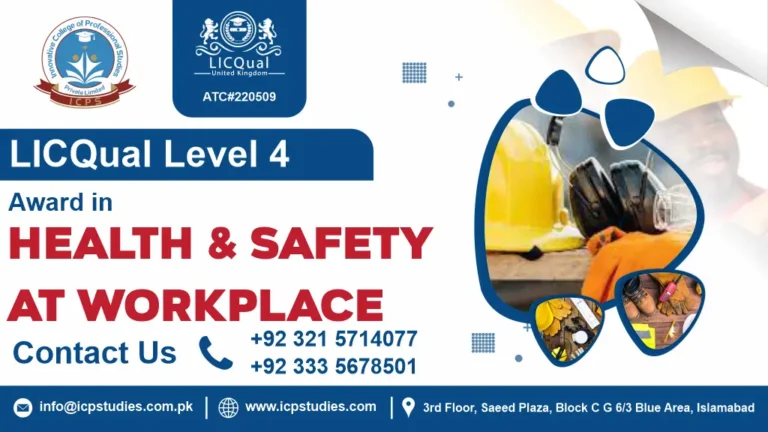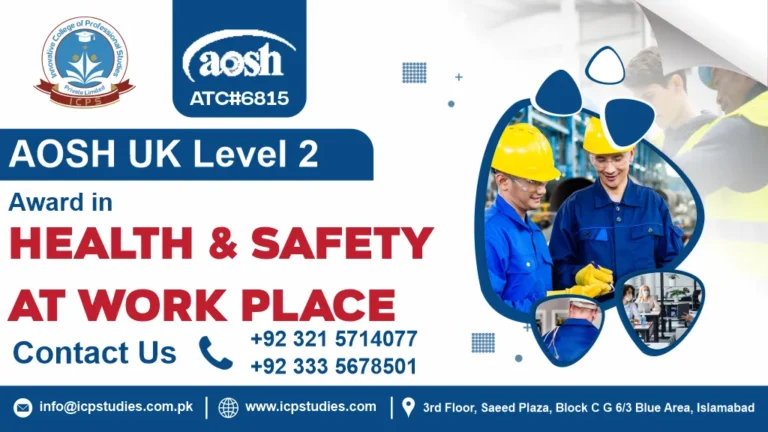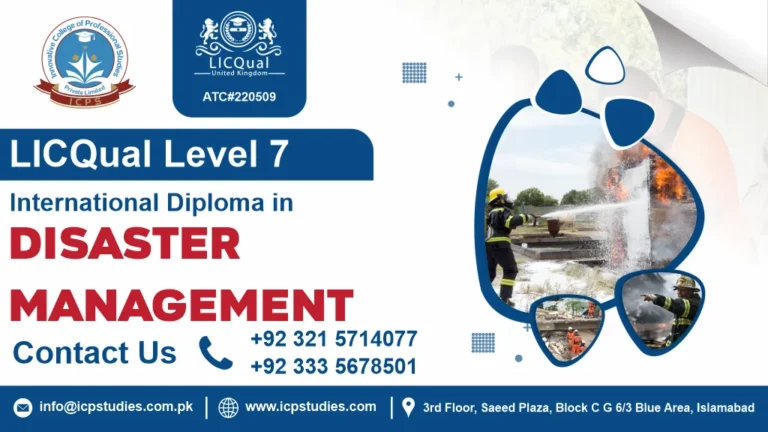Embark on a revolutionary expedition into the retail domain, where the fusion of culinary excellence and an unwavering dedication to food safety takes center stage. Behold the introduction of the AOSH UK Level 3 Award in Food Safety Supervision for Retail—a program that transcends the ordinary, empowering retail professionals not only to meet but to surpass the expectations of a discerning clientele.
In the vibrant landscape of retail, where each aisle and product serves as a canvas for culinary brilliance, upholding the highest standards of food safety is a non-negotiable commitment. The Level 3 Award serves as your master key to unraveling the intricacies of food safety supervision, meticulously crafted for individuals aspiring to excel in pivotal roles within the dynamic retail sector.
Picture a retail environment where every product not only entices the palate but also adheres to impeccable safety standards. This award is more than a mere certification; it’s a transformative passport reshaping the culinary narrative within the retail realm.
Are you ready to redefine your role in retail and make safety the cornerstone of your success? Explore the intricate details of the AOSH UK Level 3 Award in Food Safety Supervision for Retail on our website. Enroll today and join us on a transformative journey where each product on the shelf becomes a symbol of your unwavering commitment to excellence and safety. The spotlight awaits your retail brilliance!
All About AOSH UK Level 3 Award in Food Safety Supervision for Retail
Course Overview
Embark on a journey to enhance your role in the dynamic realm of retail with the esteemed AOSH UK Level 3 Award in Food Safety Supervision. This program transcends mere certification, serving as your pathway to mastering the intricacies of food safety within the retail landscape. Envision a domain where every product on the shelf symbolizes not just a commodity but also your dedication to excellence and safety.
Tailored for professionals aspiring to excel in food safety supervision within the retail sector, this award represents a beacon of expertise and leadership. It’s more than just meeting regulatory requirements; it’s about assuming the role of a guardian of safety standards, ensuring that every facet of retail operations adheres to the highest standards of food safety.
The Level 3 Award furnishes you with advanced knowledge in hazard analysis, risk management, and critical control points specific to the retail environment. Beyond theoretical concepts, the program immerses you in practical insights and real-world scenarios, preparing you for the dynamic and ever-evolving landscape of retail.
Why choose this program? It serves as your ticket to global recognition as a retail food safety expert. The curriculum not only addresses the complexities of food safety but also enhances your leadership and communication skills, essential for effective supervision in a retail setting.
Visualize a retail environment where every aisle, every product, reflects an unwavering commitment to impeccable safety standards. The AOSH UK Level 3 Award empowers you to shape such a space, where your expertise ensures the well-being of both consumers and the retail workforce.
Learning Outcomes
- Advanced Understanding of Food Safety Principles: Develop a comprehensive understanding of food safety principles relevant to the retail environment, including hazard analysis, risk assessment, and critical control points (HACCP).
- Application of Regulatory Standards: Gain the ability to interpret and apply relevant food safety regulations and standards within the retail sector, ensuring compliance with industry requirements.
- Leadership in Food Safety Supervision: Cultivate leadership skills essential for effective food safety supervision in a retail setting. Learn to lead teams, enforce protocols, and communicate safety standards to staff.
- Effective Hazard Analysis and Risk Management: Acquire advanced skills in conducting comprehensive hazard analysis and risk assessments specific to retail operations. Identify potential hazards and implement proactive risk management strategies.
- Practical Implementation of Food Safety Measures: Translate theoretical knowledge into practical application. Develop the ability to implement and oversee food safety measures, ensuring the highest standards are maintained throughout retail processes.
- Crisis Management Proficiency: Develop proficiency in crisis management specific to food safety incidents within a retail context. Acquire the skills to respond swiftly and effectively to crises, minimizing potential risks and ensuring business continuity.
- Global Perspective on Food Safety: Gain insights into global perspectives on food safety, recognizing international standards and best practices relevant to the retail sector.
- Effective Communication and Training Strategies: Enhance communication and training skills tailored for the retail environment. Learn to communicate food safety protocols clearly and effectively, fostering understanding and compliance among staff.
- Continuous Improvement and Adaptability: Instill a mindset of continuous improvement in food safety practices. Develop the ability to adapt to evolving challenges within the retail sector, staying ahead of emerging trends and technologies.
- Team Collaboration and Training: Foster collaboration within retail teams by developing effective communication and training strategies. Learn to train and guide staff in adhering to food safety protocols, creating a unified approach to safety within the retail setting.
- Legal and Regulatory Compliance: Understand and apply legal and regulatory requirements specific to food safety in retail. Ensure compliance with local and international standards, mitigating legal risks associated with food safety.
- Networking and Professional Development: Develop networking skills within the food safety and retail industries. Connect with professionals, industry experts, and mentors, fostering continuous learning, knowledge exchange, and professional development.
Admission Criteria
- Educational Qualifications: Candidates should possess a minimum educational qualification, typically equivalent to a Level 2 Award in Food Safety or a related field. Relevant educational backgrounds may include culinary arts, hospitality, or a recognized equivalent.
- Work Experience: Prospective candidates are expected to have practical experience in the retail or food industry. A minimum of one to two years of relevant work experience is often preferred, demonstrating familiarity with food safety practices within a retail setting.
- Certifications: While not always mandatory, candidates may benefit from holding a Level 2 Award in Food Safety or an equivalent certification. This foundational knowledge ensures a basic understanding of food safety principles, providing a solid starting point for the Level 3 Award.
- Language Proficiency: Proficiency in the language of instruction (usually English) is essential to comprehend course materials, participate in discussions, and complete assessments. Candidates may be required to provide evidence of language proficiency through standardized tests or previous academic qualifications.
- Age Requirement: While there is typically no strict age requirement, candidates are expected to be of legal working age in the jurisdiction where the program is offered.
Ideal Candidate
- Experience in Retail Environments: An ideal candidate has practical experience working in a retail setting, particularly in roles related to food handling, preparation, and service. This experience provides a foundational understanding of the unique challenges and dynamics of the retail industry.
- Food Safety Background: A background in food safety or a related field is beneficial. Whether through previous training, work experience, or education, the ideal candidate should have a foundational knowledge of food safety principles and practices.
- Commitment to Continuous Improvement: The ideal candidate is committed to continuous improvement in food safety practices. They seek opportunities to enhance their knowledge and skills, staying abreast of industry advancements, regulations, and best practices.
- Effective Communication Skills: As a supervisor, effective communication is crucial. The ideal candidate can articulate food safety protocols clearly to team members, fostering understanding and compliance. Strong communication skills contribute to creating a culture of safety within the retail environment.
- Leadership Aspirations: Candidates who aspire to or are currently in supervisory or managerial roles are well-suited for this program. The Level 3 Award emphasizes leadership skills in food safety supervision, preparing candidates for roles with increased responsibilities.
- Attention to Detail: Given the critical nature of food safety, the ideal candidate pays meticulous attention to detail. This includes being thorough in hazard analysis, risk assessments, and the implementation of food safety measures to prevent potential risks in a retail setting.
- Adaptability and Crisis Management Skills: An ideal candidate is adaptable and possesses crisis management skills. The retail environment can present unexpected challenges, and candidates should be equipped to handle crises effectively, minimizing risks to food safety.
- Global Perspective: While the focus is on retail, an ideal candidate recognizes the broader implications of global food safety standards. They understand the importance of aligning local practices with international best practices, ensuring a comprehensive and globally informed approach.
- Desire for Professional Development: The ideal candidate has a genuine desire for professional development. They view the Level 3 Award not just as a certification but as a stepping stone for advancing their career within the retail industry.
- Commitment to Legal Compliance: Understanding and ensuring compliance with local and international regulations is a key attribute. The ideal candidate prioritizes legal compliance in food safety practices within the retail sector.
Key Takeaways
Study Units
- Unit 1: Understanding Food Safety Legislation and Regulations
- Explore the legal framework governing food safety in the retail sector.
- Analyze relevant regulations and their implications for retail food establishments.
- Understand the responsibilities of retail supervisors in ensuring compliance with food safety laws.
- Unit 2: Microbiological Hazards in Food Safety
- Examine microbiological hazards in food and their potential risks.
- Learn about common foodborne pathogens and their impact on public health.
- Develop strategies to control and prevent microbiological hazards in a retail setting.
- Unit 3: Contamination Hazards and Controls in Retail
- Identify various contamination hazards in retail environments.
- Explore preventive measures and controls to mitigate contamination risks.
- Understand the importance of maintaining a hygienic retail space to ensure food safety.
- Unit 4: Food Storage and Preservation in Retail
- Gain insights into proper food storage practices within a retail setting.
- Learn techniques for preserving the quality and safety of perishable and non-perishable foods.
- Understand temperature control and storage principles to prevent spoilage and contamination.
- Unit 5: Safe Food Preparation and Handling in Retail
- Focus on safe and hygienic food preparation methods in a retail environment.
- Learn best practices for handling, processing, and cooking food to prevent cross-contamination.
- Explore the role of retail supervisors in enforcing safe food preparation standards.
- Unit 6: Personal Hygiene and Staff Training in Retail
- Emphasize the importance of personal hygiene among retail staff.
- Explore training strategies for staff to ensure they are well-versed in food safety protocols.
- Understand the role of supervision in maintaining high personal hygiene standards.
- Unit 7: Monitoring and Reviewing Food Safety Procedures
- Develop skills in monitoring and evaluating food safety procedures.
- Understand the importance of regular reviews and audits in ensuring continuous improvement.
- Explore methods for implementing corrective actions and addressing non-compliance issues.
- Unit 8: Communication and Reporting in Food Safety
- Focus on effective communication within a retail team regarding food safety protocols.
- Explore reporting mechanisms for incidents, hazards, and improvements.
- Understand the role of clear communication in maintaining a culture of food safety.
- Unit 9: Environmental and Waste Management in Retail
- Address environmental considerations related to food safety in a retail setting.
- Explore waste management strategies to minimize environmental impact.
- Understand the role of sustainability in retail food safety practices.
- Unit 10: Customer Interaction and Allergen Management
- Examine the role of retail staff in managing customer interactions related to food safety.
- Focus on allergen management and communication to ensure customer safety.
- Understand the legal obligations and best practices for handling allergens in retail.
FAQs for AOSH UK Level 3 Award in Food Safety Supervision for Retail







